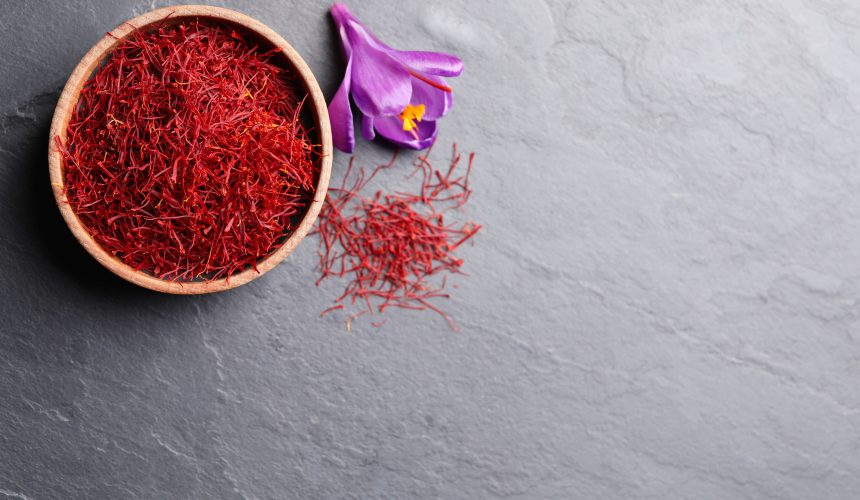Obesity and type 2 diabetes are major health problems throughout the world. Both conditions are complex with numerous contributing factors, including persistent intake of excess calories, reduced daily activity/energy expenditure, dysbiosis, mitochondrial dysfunction, genetics, and altered circadian rhythms. Chronic low levels of inflammation and oxidative stress are commonly recognized drivers of the pathophysiology.
Study design: In this randomized, double-blind, placebo-controlled trial (RCT), sixty obese men (BMI>30kg/m2) with type 2 diabetes mellitus (T2DM)1 were randomized to four groups of fifteen: 1) concurrent exercise training2 3 X week plus placebo3, 2) saffron supplementation (1 X 100mg/day), 3) concurrent exercise training plus saffron supplementation (1X 100mg/day, and 4) control, regular lifestyle with no training and no supplementation.
At the onset and conclusion of the trial 12 weeks later the following were measured: inflammatory markers (TNF-α, hs-CRP, IL-6 and IL-1β), body composition (waist-to-hip ratio, BMI, as well as body fat percentage and lean body mass using a multi-frequency bioelectrical impedance device), and metabolic profile (fasting blood glucose, homeostasis model for insulin resistance (HOMA-IR) scores and HbA1C levels).
Results: In all three intervention groups there was a significant reduction in the inflammatory markers, as well as reduced blood glucose markers, increased IL-10 concentration, and improved body fat percentage compared to control. Moreover, in all three intervention groups there was a positive correlation between changes in body fat percentage and inflammatory cytokines. The changes in all variables were significantly greater in the group using both saffron and exercise training compared to the group taking only saffron and the group only following an exercise program.
Study strengths include strict inclusion and exclusion criteria, carefully controlled measurement procedures, and a standardized and trained exercise protocol. Moreover, the study design was four arms and parallel, meaning it could not only determine treatment effects compared to control but also identify the independent treatment effects obtained from only saffron supplementation compared to exercise training alone.
Study weaknesses: Each group contained only 15 people, which is enough for statistical significance but may not be large enough to detect the treatment effect of saffron supplementation or be representative of the general population. BMI >30kg/m2 was the only inclusion criteria for obesity. BMI has been recently recognized as a limited and insufficient measurement for obesity that should not be used in isolation4. Dietary intake monitoring was based only on self-reported nutrient intake before and after the 12-week intervention; dietary intake could have been more precisely and regularly controlled throughout the trial. Finally, bioelectrical impedance (BIA) was used to measure body composition. BIA can be a valid and reliable crude marker but has limitations compared to the gold-standard measurements of body composition such as dual-energy X-ray absorptiometry or hydrostatic weighing.
Conclusion:
Saffron supplementation may provide additional benefits to exercise training in the reduction of inflammation and improvement of metabolic parameters in obese men with T2DM. The results of this well designed, parallel, prospective 4 arm RCT strengthen other studies demonstrating significant benefits of saffron supplementation on inflammation and markers of blood sugar dysregulation.
Footnotes:
1: Type 2 diabetes mellitus was defined according to American Diabetes Association criteria. Each participant needed to have T2DM for at least 2 years.
2: Exercise training included both resistance and aerobic exercise 3 times per week and followed a specific guideline according to the recommendations of the American College of Sports Medicine for individuals with T2DM.
3: Placebo was 1 pill maltodextrin per day.
4: Why BMI is flawed: and how to redefine obesity. https://www.nature.com/articles/d41586-023-03143-x (accessed Oct 20, 2023).
Reference:
Hooshmand Moghadam B, Rashidlamir A, Attarzadeh Hosseini SR, Gaeini AA, Kaviani M. The effects of saffron (Crocus sativus L.) in conjunction with concurrent training on body composition, glycaemic status, and inflammatory markers in obese men with type 2 diabetes mellitus: A randomized double-blind clinical trial. Br J Clin Pharmacol. 2022 Jul;88(7):3256-3271


